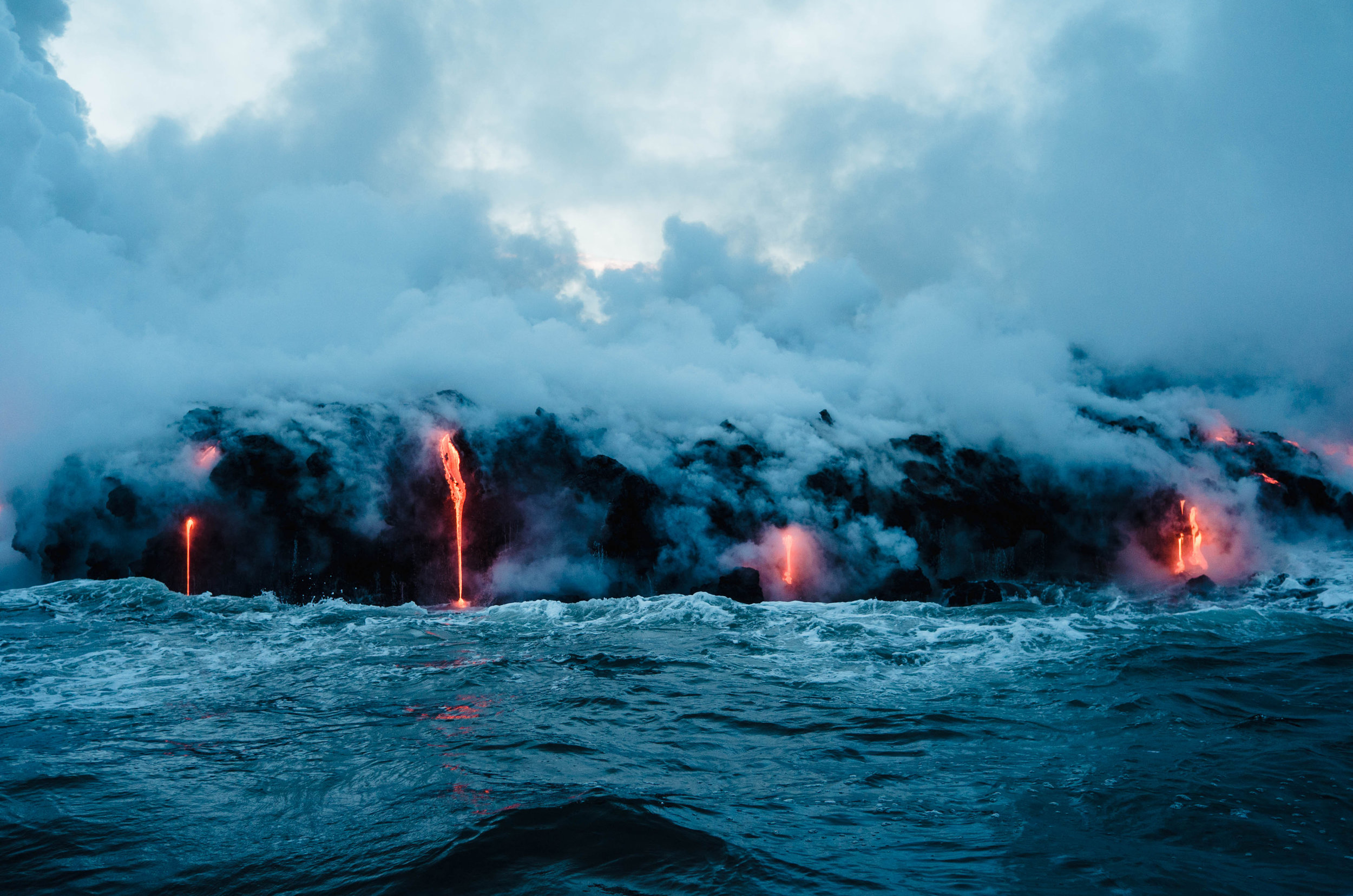Photograph of lava reaching the water by Buzz Andersen.
Aedgar's words are written this way.
Nerida's words look like this.
I’ve a question about our planet.
Yes.
There’s some discussion among the scientists at the moment about water and where water comes from.
Yes.
Some of them say that water came from outer space and that it was brought here when the earth collided with er, perhaps, asteroids.
Yeah, you could call it a — now you would call it a chemical reaction.
It is partly true. They’re finding little bits here and there — and there is truth to it. But that’s not all there is.
There are others who are saying that the earth can generate water itself from deep inside.
If the earth gets some help, yes.
Aah. So a little bit of —
We are trying to organise things, on a different level.
Sometimes, you know, it takes bigger measures, bigger impacts, for humans to learn.
So we could generate more.
I am not talking about myself.
I’m part of a very big team, you know.
So, we try to balance. We could try a bit harder —
If humans were —
— we could, but, where is the learning experience?
People’ll think, ‘Oh, yes, it’s all going to be fine. We found a way.’
No you didn’t. You had support.
Unless you are able to learn from things and acknowledge that not everything that you observed is getting better, because you just observed it — you didn’t do anything — what’s the learning experience out of that? Very little. Very low level.
Our friend was concerned that this could be used as an argument that it’s okay to use all the water or poison the water, because the earth is always gonna make some more. If our resources are not finite, we can take it granted, as we we always have and waste it, as we always have.
It is finite. If you don’t learn how to handle things, including which things you should support and which things you should abandon, it’s gonna be finite.
Hmm, very quickly.
Yes.
The planet itself has got consciousness.
The planet is fortunate that there are still areas where people live in harmony with nature, where there is still a possibility that they could create things — like having the energies on a level that would help create it.
So, yeah.
We need to learn more about that and strengthen that and reinforce it so that more of us are working cooperatively with the planet that way.
Yes. That’s right. So, you do need to make observations.
But just observing things: putting a mathematical, physical, chemical formula onto it, doesn’t mean you know how it works. This is what they think, ‘I have a formula. That’s how it works.’ It’s not quite true.
I’ve said it many times — you’ll still don’t understand how to measure many things because you have to put numbers on everything.
You know, it doesn’t mean things are non-existent just because you haven’t got numbers for them. There’s a limitation in the way some people think — that they consider ‘Well, it’s not existing because we can’t see it, we can’t hear it, we can’t feel it, we can’t taste.’ All these things.
Doesn’t mean it’s not there. Do you understand?
Just because you can’t measure it, doesn’t mean it’s not there?
Yes. Or you can’t see, feel or taste it — all these things. Does not mean it’s not there.
Uhuh. So is this about consciousness? The role of consciousness in creation of water, for example, in the earth —
Yes.
— and intention?
Yes.
This is how easy it could be.
But there will always be interference.
You know, it’s not wrong if people say, ‘Are you living on a different planet? Why do you think it should work?’
Maybe they do. Maybe, in what you call the night time, they’re in their dreams — they’re off to a different planet. That’s why they know how to do it.
Hmm.
So something as simple as five or ten minutes a day thinking about the spirit of the water and the intention and the beauty and the energy of the water; thinking about its part in our lives on earth and nourishment of the plants and the animals — something as simple as this could make a difference?
Yes. Because water, as you call it, you know, you could call water the creator of life, sustaining life, nourishing life, supporting consciousness.
They say, you know, this person hasn’t got enough water, so this person is unconscious now.
Water is vital to survival.
The more you waste it, the more you’re scratching on the surface of survival [makes a gesture like scratching claws].
If you scratch enough, it’s gone. It’s just scratched off. Disappears.
You mean the margin of our survival on this planet is so thin, metaphorically speaking?
Yes.
Every little bit of damage and abuse makes our survival more tenuous.
Yes, you could see it that way.
There can be some other ways to see it. We will tell you, when you’re ready to hear it.
[Softly] Okay.



